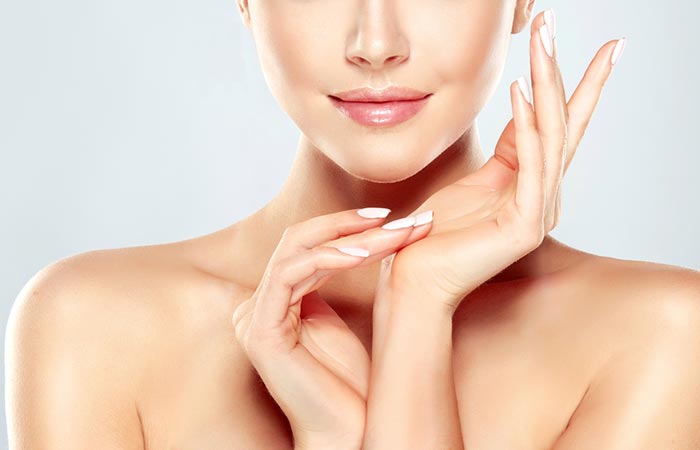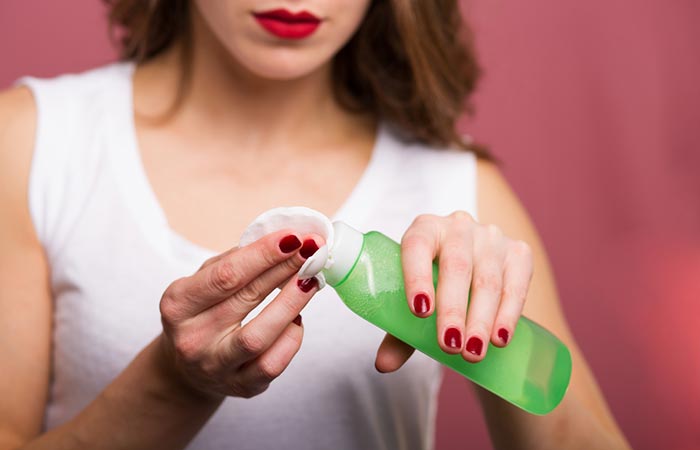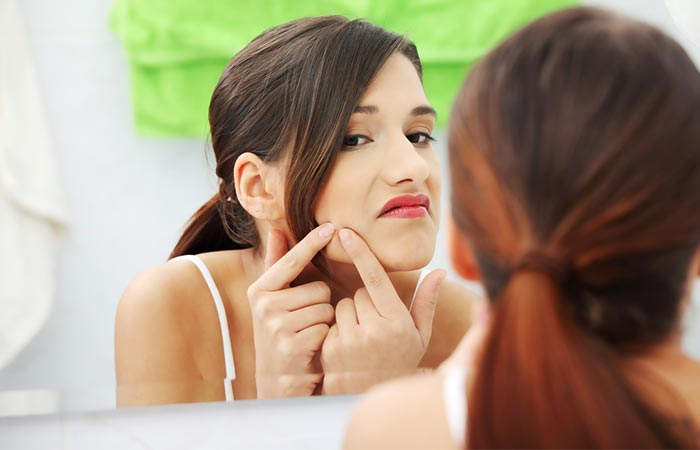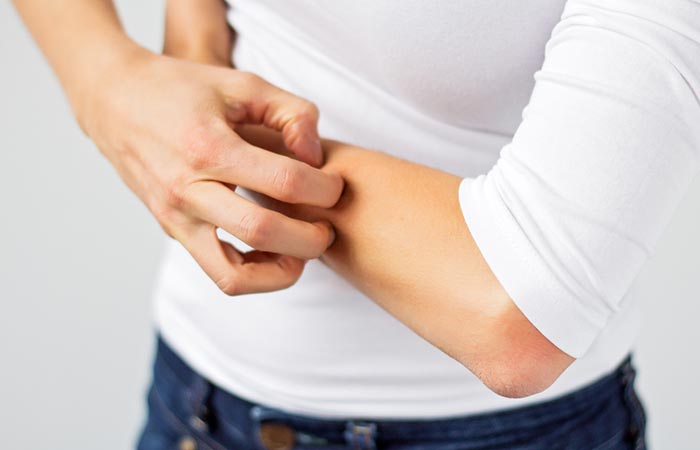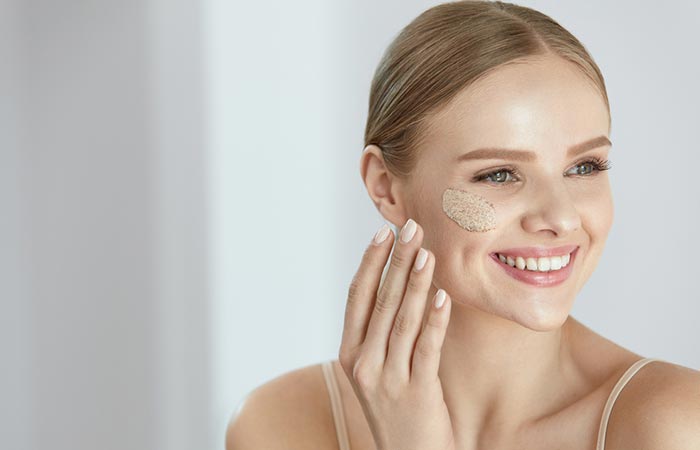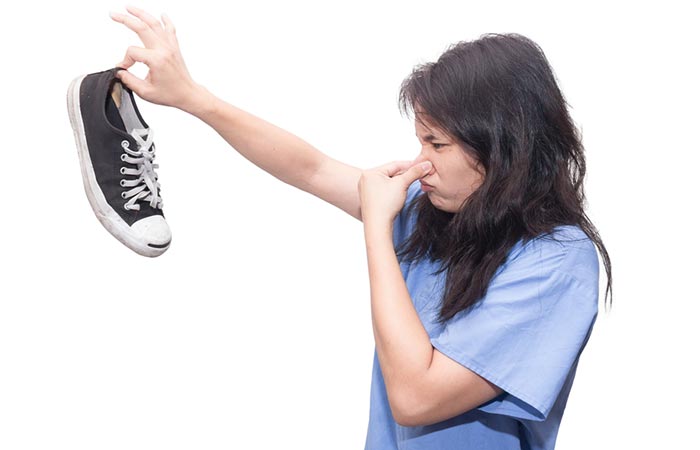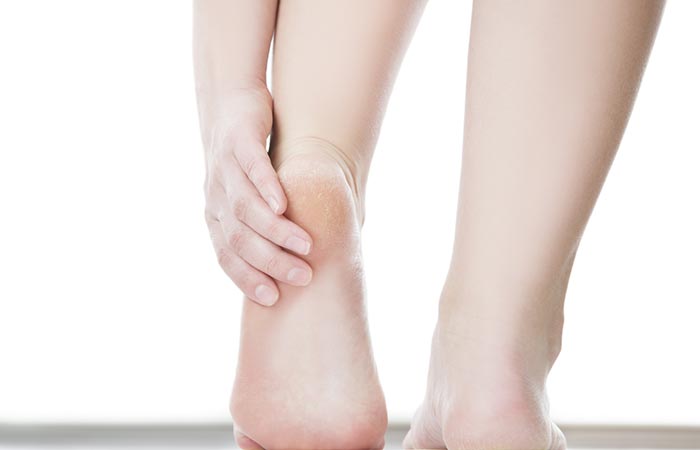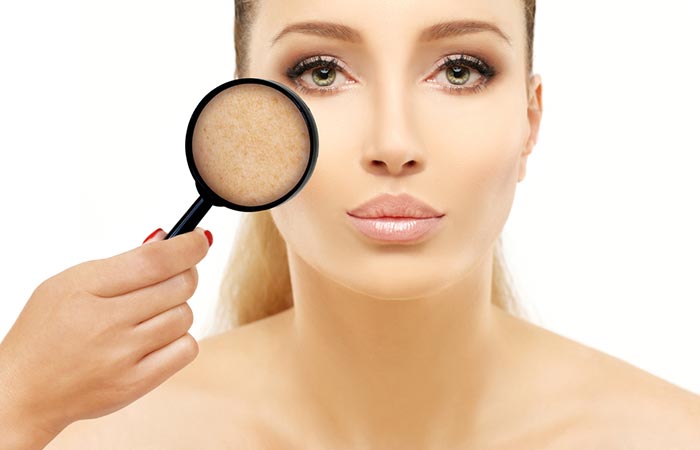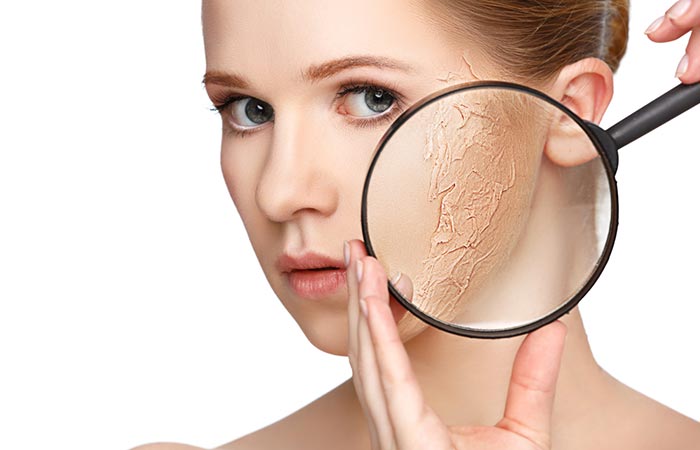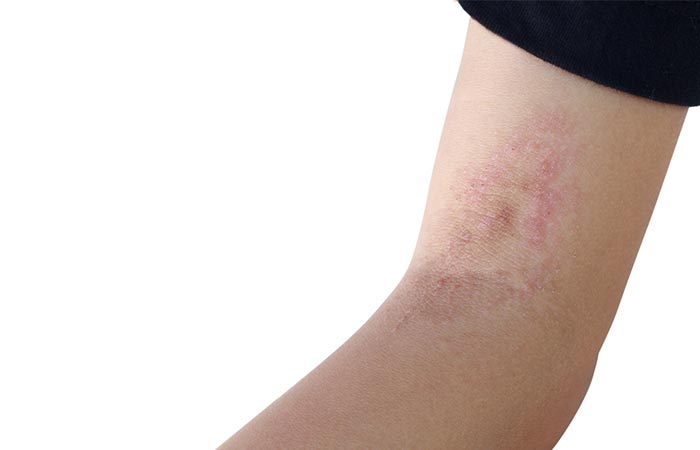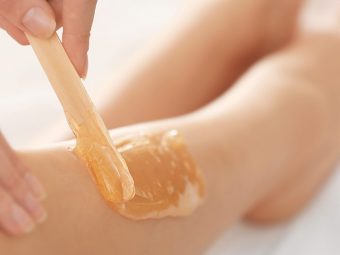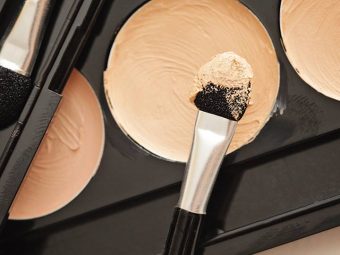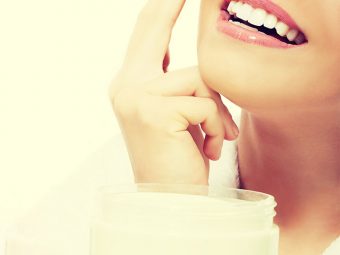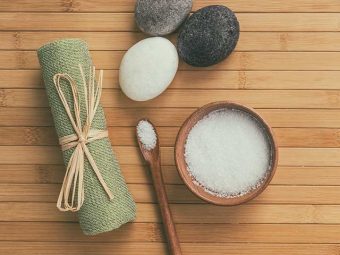17 Surprising Ways To Use Vinegar For Your Skin
Rejuvenated, radiant, and healthy skin is yours for the taking with this natural remedy.
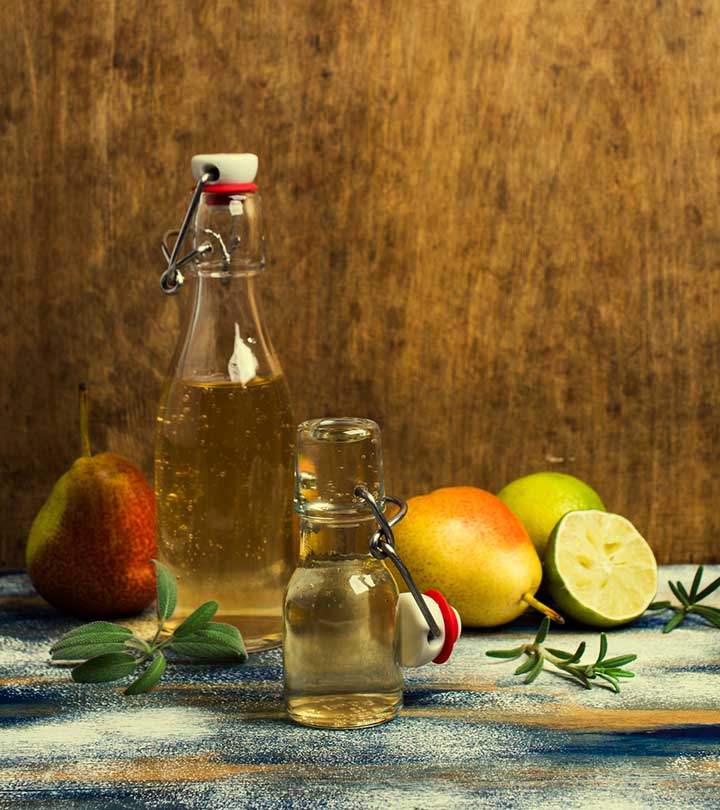
Vinegar has multiple benefits on your skin. You can use vinegar for skin issues like body odor and dullness. As a common item found in almost every kitchen, it is a wonderful solution to attain that much-loved skin glow and radiance. Wondering how to incorporate it into your skin care routine? We can help you. This article will help you find different ways to include vinegar in your beauty regimen. Keep reading!
In This Article
Why Use Vinegar For Your Skin?
Vinegar (both white and apple cider vinegar) helps in restoring the pH balance of your skin. This, in turn, helps treat itchy and dry skin, acne, and flaky skin. Compared to the commercially available soaps and face washes that are loaded with chemicals and preservatives, vinegar is a natural and safer way to rejuvenate your skin and make it glow.
Caution: Never use apple cider vinegar or any other vinegar in the undiluted form as it might burn your skin.
Let us now look at the benefits of using vinegar for your skin.
Benefits Of Vinegar For The Skin
1. Lightens And Prevents Blemishes, Acne, And Pimples
Vinegar has antibacterial and antifungal properties, which help in eliminating bacteria from your skin, thus keeping acne and blemishes at bay (1), (2), (3), (4).
2. Eliminates Age-related Spots
Apple cider vinegar contains hydroxy acids that slough off the dead skin cells, thus lightening age-related spots.
3. Helps Maintain The pH Of Your Skin
Vinegar maintains the pH balance of your skin and prevents it from becoming excessive oily or dry (5). It also helps in keeping the skin pores clean.
4. Minimizes Wrinkles
Applying diluted vinegar regularly helps delay the appearance of wrinkles and fine lines on your skin.
5. Removes All Toxins From Your Face
Regular use of vinegar draws out all toxins from your skin, leaving it radiant and youthful.
6. Soothes Sunburns
Vinegar has antiseptic properties and helps relieve pain. Simply dab some vinegar on your sunburn and watch it heal.
These were the magical uses of this simple ingredient. But how can you use vinegar to achieve glowing skin? Scroll down to find out.
How To Use Vinegar On Your Skin
1. As A Facial Toner
You Will Need
- 1 tablespoon of vinegar (white or apple cider vinegar)
- 2 cups of water
- 1 tablespoon of aloe vera gel (optional)
Time
1-2 minutes
Method
- Mix all the ingredients and store in a bottle.
- Dab a cotton ball with the toner.
- Apply it to your face and neck.
How Often?
Do this it 2-3 times a day or every time you wash your face.
Why This Works
Vinegar has astringent properties, and it also contains hydroxy and acetic acids. These help minimize the pores and promote circulation.
2. To Heal Sunburns
You Will Need
- Apple cider or white vinegar
- Water
Time
1-2 minutes
Method
- Mix apple cider vinegar with water (there is no fixed ratio, but make sure the vinegar is well diluted).
- Pour the mixture into a spray bottle and spray it on the sunburned area.
- You can also dip a cloth in the mixture, wring it and pat it on the sunburned area.
- Or you can add the diluted mixture to a bucket of water and take a bath with it.
How Often?
Do this 2-3 times a day.
Why This Works
Vinegar soothes sunburns with its antiseptic properties. It also restores the pH balance of your skin, promotes cell regeneration and healing, and prevents blistering.
3. As A Treatment For Acne And Blemishes
You Will Need
- 2 tablespoons of vinegar
- 2 tablespoons of aloe vera gel
- Water
Time
1-2 minutes
Method
- Mix the ingredients and transfer the mixture to a spray bottle.
- Spray it on your face.
How Often?
Spray every 1-2 hours throughout the day.
Why This Works
The acidity of the vinegar dries out the acne and pimples, and its antibacterial properties eliminate the pimple-causing bacteria (6).
4. To Heal Razor Bumps
You Will Need
Diluted apple cider vinegar
Time
1 minute
Method
- Splash the affected area with diluted apple cider vinegar.
- Leave it to air dry.
How Often?
Twice a day or until the razor bumps disappear.
Why This Works
Apple cider vinegar has anti-inflammatory properties, which help in soothing irritated skin (7). The acetic acid in it softens the skin, thus facilitating easy removal of ingrown hair.
5. As An Antiseptic For Itchy Skin
You Will Need
Diluted apple cider vinegar (or white vinegar)
Time
1 minute
Method
- Saturate a cotton pad with diluted apple cider vinegar (or white vinegar).
- Dab the pad on the affected area and let it dry.
How Often?
Until the rash heals.
Why This Works
Bug bites, poison ivy, and rashes – anything can cause itchy skin. Apple cider vinegar exhibits excellent antiseptic and antifungal properties that kill the infection-causing fungi and heal the affected area (8).
Note: Use raw and organic apple cider vinegar for best results.
6. For Eliminating Body Odor
You Will Need
- A bucket of water
- 1/2 cup of white or apple cider vinegar
Time
2-3 minutes
Method
Pour the cup of vinegar into a bucket of water and use it for bathing.
How Often?
Twice a day.
Why This Works
Sweating and bacteria often result in body odor. Vinegar has antifungal and antibacterial properties that help in fighting these odor-causing bacteria.
7. As A Facial And Hand Scrub
You Will Need
- 1 tablespoon of white vinegar
- 2 tablespoons of coarsely grounded rice
Time
2- 3 minutes
Method
- Take a bowl and mix the ground rice with vinegar.
- Massage your face and hands with this scrub for 15 minutes.
How Often?
Once or twice a week.
Why This Works
Vinegar exfoliates the dead skin cells and helps rejuvenate your skin. This scrub makes your skin glowing and smooth without causing any irritation.
8. For Managing Dandruff
You Will Need
- 2 tablespoons of warm water
- 2 tablespoons of apple cider vinegar
Time
1-2 minutes
Method
- Mix the water and vinegar in a bowl.
- Massage the mixture into your scalp and leave it on for at least 5 minutes.
- Wash with lukewarm water.
How Often?
Twice or thrice a week or as long as the problem persists.
Why This Works
Vinegar is known for its antifungal properties that help in destroying the dandruff-causing fungus (9).
9. To Eliminate Foot Odor
You Will Need
- 1 cup of apple cider vinegar
- Baby wipes or paper towels
Time
1 day
Method
- Soak the baby wipes or paper towels overnight in apple cider vinegar.
- Store them in a ziplock bag in the fridge.
- Use them to wipe your feet.
How Often?
Do this every day.
Why This Works
The acids in apple cider vinegar alter the pH of the skin on your feet and prevent bacterial growth (10). These wipes can also be used as deodorizers for your underarms.
Note: Some of you may find the smell of apple cider vinegar disgusting, but don’t worry, the smell doesn’t linger for long.
10. To Reduce Oiliness
You Will Need
- 2 cups of water
- 1 cup of vinegar
- Cotton pads
- Spray bottle
Time
1-2 minutes
Method
- Mix the vinegar and water.
- Dab a cotton pad in this solution and wipe your face with it.
- You may even use a spray bottle to spray it on your face.
How Often?
Twice or thrice a day.
Why This Works
The acidic and astringent properties of the vinegar help absorb excess oil, making your skin smooth.
Quick Tip: Leave it on overnight to watch your age spots vanish.
11. To Heal Cracked Heels
You Will Need
- 1 cup of white vinegar (or apple cider vinegar)
- 2 cups of water
- 1 cup of curd
- Pumice stone
Time
25-30 minutes
Method
There are two ways you can treat your cracked heels:
Method 1
- Mix the white vinegar with lukewarm water.
- Soak your feet in this for 20-25 minutes and then scrub the dead skin cells with a pumice stone.
Method 2
- Mix the white vinegar with a cup of curd.
- Apply it on the cracked heels, leave it on for a few minutes and then scrub it off.
How Often?
Repeat this process twice daily until the heels heal. Follow it up with a good moisturizer.
Why This Works
The antibacterial and moisturizing properties of curd work in tandem with the vinegar to remove the dead skin cells and fill the cracks.
12. To Detoxify Your Skin
You Will Need
- 1 teaspoon of vinegar
- Bentonite clay (you may use Fuller’s Earth or any other clay)
Time
2 minutes
Method
- Mix vinegar with clay and make a thick paste.
- Apply the pack all over your face.
How Often?
Twice a week.
Why This Works
The vinegar exfoliates your skin and balances its pH, while the clay extracts all the impurities from the pores.
13. To Clear Skin Pigmentation
You Will Need
- 1 teaspoon of white vinegar
- 1 teaspoon of onion juice
- 2-3 teaspoons of rosewater
Time
2 minutes
Method
- Mix all the ingredients and pour into a spray bottle.
- Spray it on your face.
- Leave it on for a while and then wash it off.
How Often?
Once a week.
Why This Works
Rosewater has anti-inflammatory properties and absorbs excess oil from the skin. Vinegar has astringent properties that reduce the appearance of dark patches and pigmentation (11).
14. To Remove Blackheads
You Will Need
- 2 ripe strawberries
- 1 teaspoon of white vinegar (diluted)
Time
2 minutes
Method
- Make a paste of the strawberries and mix white vinegar in it. Blend well.
- Apply the paste on the affected area.
- Gently massage for a few minutes and then wash it off.
How Often?
Once a week.
Why This Works
Strawberry contains folic acid and vitamin C that help in cell regeneration, remove harmful toxins, and aid collagen synthesis. Vinegar absorbs excess oil and cleans the pores, thus helping in getting rid of blackheads.
15. To Treat Dry And Flaky Skin
You Will Need
- 1 teaspoon of white vinegar
- 2 teaspoons of olive oil
Time
1 minute
Method
- Blend the oil and vinegar and apply it to your face or the affected area.
- Leave it on for 10 minutes and then wash with lukewarm water.
How Often?
Once a day.
Why This Works
Olive oil moisturizes and rejuvenates your skin, and vinegar helps in restoring the natural acidity of your skin.
16. To Treat Skin Warts
You Will Need
- 1 teaspoon of apple cider vinegar
- 2 teaspoons of water
Time
1-2 minutes
Method
- Mix water with apple cider vinegar and soak cotton balls in the solution.
- Apply the cotton ball to the wart.
- Cover it with a bandage and leave it on overnight.
How Often?
Daily (until the wart falls off).
Why This Works
The acetic acid in the vinegar kills bacteria and viruses causing the wart, making the wart fall off in a few days (12).
17. To Treat Ringworm Effectively
You Will Need
- Apple cider vinegar (dilute it a bit)
- Cotton pads
Time
1 minute
Method
- Soak the cotton pad in undiluted vinegar.
- Gently brush the pad over the affected area.
How Often?
Repeat this 3 times every day.
Why This Works
Apple cider vinegar has strong antifungal properties that help in curing ringworm when applied topically.
Vinegar works wonders for your skin but only if you use it carefully. You need to keep a few things in mind before including it in your daily skin care regimen. They are as discussed below.
A Few Tips To Consider
- Don’t forget to dilute the vinegar (unless advised otherwise by any skincare specialist) as it might cause a burning sensation.
- Always do a patch test before applying vinegar. Sprinkle a few drops on your arm and wait for a few minutes to ensure there isn’t any skin irritation.
- Avoid consuming it orally if you have diabetes, peptic ulcer, or heartburn. The acidic nature of vinegar might worsen the problem.
- If you are pregnant or nursing, consult a doctor before using vinegar.
- Avoid using strong perfumes or soaps while using vinegar as they might further irritate your skin.
- Although apple cider vinegar is touted as the best treatment to get rid of dandruff, avoid using it excessively as it can make your hair brittle.
- If you have any skin ailment and are using any prescribed medication, consult the doctor before using vinegar along with the medicine. The acidic nature of the vinegar often reacts with the chemicals in the skin ointments and medicines.
- Always use organic vinegar for best results.
As summer hits, it brings with it a slew of skin problems. Vinegar is a simple and inexpensive approach to treat various skin issues, but only when used correctly. It is a natural and risk-free way to brighten and revitalize your skin. Now that you know the numerous advantages of vinegar for skin, do not delay incorporating the finest quality vinegar into your regular beauty routine. However, to prevent unwanted adverse reactions, it is always best to visit a doctor or perform a patch test before using them.
Frequently Asked Questions
Can apple cider vinegar damage your face?
Yes. Direct application of apple cider vinegar can cause skin irritation, redness, and dryness. Ensure that apple cider vinegar is diluted with water before application (13).
How long does apple cider vinegar take to lighten dark spots?
While current scientific evidence indicates that apple cider vinegar may lighten dark spots, there is no information to tell us how long it will take to show results. You will have to use apple cider vinegar a few times before it starts working (14).
Is apple cider vinegar good for dark inner thighs?
Possibly. Anecdotal evidence suggests that apple cider vinegar may lighten your inner thighs over time.
Sources
Articles on StyleCraze are backed by verified information from peer-reviewed and academic research papers, reputed organizations, research institutions, and medical associations to ensure accuracy and relevance. Read our editorial policy to learn more.
- Acetic acid and the skin: a review of vinegar in dermatology
https://pubmed.ncbi.nlm.nih.gov/34350993/ - Authenticating apple cider vinegar’s home remedy claims: antibacterial antifungal antiviral properties and cytotoxicity aspect
https://pubmed.ncbi.nlm.nih.gov/29224370/ - Herbal Remedies for Acne Vulgaris from the Viewpoint of Persian Medicine
https://www.ncbi.nlm.nih.gov/labs/pmc/articles/PMC7475631/ - Contemporary pursuits of vinegar from scullery to dermatology
https://www.researchgate.net/publication/343772765_Contemporary_pursuits_of_vinegar_from_scullery_to_dermatology - Art of prevention: The importance of bath time and avoiding extended exposure to irritating and allergenic chemicals
https://www.ncbi.nlm.nih.gov/labs/pmc/articles/PMC6637102/ - Treatment Modalities for Acne
https://www.ncbi.nlm.nih.gov/labs/pmc/articles/PMC6273829/ - Home Remedy Use Among African American and White Older Adults
https://www.ncbi.nlm.nih.gov/labs/pmc/articles/PMC4631220/ - Apple cider vinegar soaks do not alter the skin bacterial microbiome in atopic dermatitis
https://www.ncbi.nlm.nih.gov/labs/pmc/articles/PMC8172074/ - Preparation and Optimization of Garlic Oil/Apple Cider Vinegar Nanoemulsion Loaded with Minoxidil to Treat Alopecia
https://www.ncbi.nlm.nih.gov/labs/pmc/articles/PMC8706394/ - What helps to get rid of athlete’s foot?
https://www.ncbi.nlm.nih.gov/books/NBK279548/ - Use of organic acids in acne and skin discolorations therapy
https://pubmed.ncbi.nlm.nih.gov/25811473/ - Vinegar: Medicinal Uses and Antiglycemic Effect
https://www.ncbi.nlm.nih.gov/labs/pmc/articles/PMC1785201/



